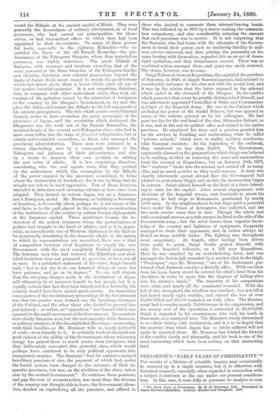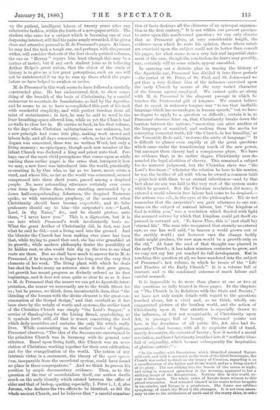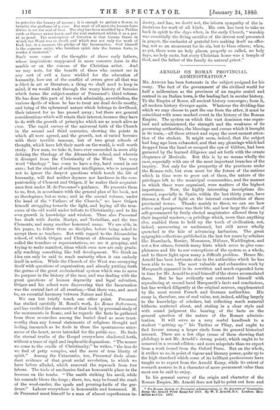PRESSENSE'S "EARLY YEARS OF CHRISTIANITY."* THE results of a lifetime
of scientific inquiry may occasionally be summed up in a single sentence, but it is otherwise with historical research, especially when regarded in connection with a subject so intricate as the one under our present considera- tion. In this case, it were folly to presume to analyse or sum • The Early Tears of Christianity. By E. de Preesense, D.D. Translated by Annie Harwood.Holenden. London : Hodder and Stoughton. 1879.
up the patient, intelligent labour of twenty years after any exhaustive fashion, within the limits of a newspaper article. The student who cares for a subject which is becoming one of ever deepening interest, will find his pains amply rewarded, if he give a close and attentive perusal to M. de Pressense's pages. At times, he may find the task a tough one, and perhaps, with the present writer, will consider that out of the four closely-printed volumes, the one on " Heresy " repays him least (though this may be a matter of _taste) ; but if any such student joins us in believing Arthur Helps's great axiom, that the object of the study of history is to give us a few great perceptions, such an one will not be uninterested if we try to sum up those which the pages before us have helped to awaken or revive.
M. de Pressense in this work seems to have followed a carefully constructed plan. He has endeavoured, first, to show some- thing of the breadth of the basis of Christianity, by a careful endeavour to ascertain its foundations, as laid by the Apostles, and he seems to us to have accomplished this part of his task with wonderful simplicity, and with perfect freedom from all taint of sectarianism ; in fact, he may be said to revel in the freer breathing-space allowed him, while as yet the Church had no walls to close her in. He carries us back, in his first volume, to the days when Christian sabbatarianism was unknown, but a new principle had come into play, making work sacred and labour holy, and all days consecrate,—when, so far as Christian dogma was concerned, there was no written Word, but only a living memory ; no episcopacy, though each new member of the infant Church was declared a king and priest unto God. Per- haps one of the most vivid perceptions that comes upon us while reading these earlier pages is the sense that, interpret it how we may, a new force was introduced into the world, practically re-creating it, by One who, so far as we know, never wrote a word, and whose life, so far as the world was concerned, seemed compressed into three short years, passed among a despised people. No more astounding utterance certainly ever came even from lips divine than, when standing surrounded by a dozen half-comprehending fishermen, the despised Nazarene spoke, as with unconscious prophecy, of the moment when Christianity should have become respectable, and its false professors should say to him—the carpenter's son—" Lord, Lord, in thy Name," &c., and he should profess unto them, " I never knew you." This is a digression, but it is one into which Pressense's work involuntarily leads us. What the great Author of Christianity did, iu fact, was just what he said he did,—cast a living seed into the ground. And the blunder the Church has been making ever since has been that, while trying to guard that seed, she has ever grumbled at its growth ; while modern philosophy denies the possibility of its hidden root, or else would fain dig up the tree to see what roots are there. But we shall have much to answer for to M. de Pressense, if he tempts us to linger too long over the very first elements of his work. The living plant with which he deals has shed its husks many an autumn since it first grew green, but growth has meant progress as divinely ordered as its first beginnings, and it does not seem quite as clear to us as it does to M. de Pressense that the nearer we can get to Apostolic inter- pretation, the nearer we necessarily are to the truth fittest for - us ; but he proves, we think, from incontestable data, that " the blending of the human with the divine element is the great con- summation of the Gospel design," and that overlaid as it has been since by the weight of words and systems, the earlier feast of the Christian Church was simply "the Lord's Supper," a service of thanksgiving for the Living Bread, symbolising, as it symbols forth still, all that is truest concerning the food which daily nourishes and sustains the only life which really lives. While commenting on the earlier modes of baptism, Pressense observes, "The idea of the Sacraments entertained in the primitive Church was in harmony with its general con: stitution. Based upon living faith, this Church was an asso- ciation of Christians working together for their own edification, and for the evangelisation of the world. The notion of any intrinsic virtue in a sacrament, the theory of the opus opera- tunt, inseparable from the sacerdotal system, could have found no place in these congregations." And we think he proves his position by ample documentary evidence. Then, as to the question of the rise of sacerdotalism itself, our author dwells much on the early identity which existed between the office of elder and that of bishop, quoting especially, I. Peter i., 1, 2, also Jerome, who declares the two offices to be identical, as did the whole ancient Church, and he believes that " a careful examina-
tion of facts destroys all the chimeras of an episcopal organisa- tion in the first century." It is not within our present province to enter upon this much-vexed question ; we can only observe that as Pressensd gives, at very considerable length, the evidence upon which he rests his opinion, those whose minds are exercised. upon the subject could not do better than consult his pages, for what seems to us a very fair and impartial state- ment of the case, though the conclusions he draws may possibly,. nay, certainly will to some minds, appear one-sided.
In carrying out a definite plan in tracing the history of the Apostolic age, Pressens6 has divided it into three periods —the period of St. Peter, of St. Paul, and St. John—and we get thus a very distinct idea of the influence exercised upon the early Church by means of the very varied character of the human agency employed. We cannot quite go along with M. de Pressense iu the eloquent passage in which he
touches the Pentecostal gift of tongues. We cannot believe- that to speak in unknown tongues was " to use that ineffable
language which has no analogue in human speech," but we have no dogma to apply to a question so difficult ; certain it is, as Pressense observes later on, that Christianity breaks down the barriers between the nations, " mastering one after another of the languages of mankind, and making them the media for conveying immortal truth, till the Church, in her humility,' as the Venerable Bede said, re-forms the unity of language.' " It is difficult to glance even rapidly at all the great questions which came under the transforming touch of the new power,. but amongst them slavery had a conspicuous place. We have no evidence that, in its earlier stages, Christianity ever de-- ma.nded the legal abolition of slavery. This remained a subject for its maturer judgment, but the Christian slave was " the Lord's freedman ;" whatever the relation he bore to his master, he was the brother of all with whom he owned a common faith —joint-heir with them to an eternal inheritance—and by that fact alone an axe was laid to the very root of the system under which he groaned. But the Christian revelation did more ; it entered a world wherein free labour had come to be despised,— the artisan was vile, in the eyes of the philosopher. We do not remember that the carpenter's son gave utterance to one sen- tence on the subject of manual labour, but " the kingdom of God is within you," was a revelation which flooded with light
the meanest service by which that kingdom could get itself ex- pressed in outward act.. To know Thee, this is' (not shall be)'
eternal life.' The mau who recognised that eternity as entered saw, as one has well said, " in heaven a world grown out of
the earthly world ; and however vast the change bodily death might produce, the new man would be a growth only on the old." At least the seed of that thought was planted in the early Church ; it has taken nineteen centuries to grow, and we may not say has yet reached its full development. But in, touching this question at all, we have wandered into the subject of Pressense's last volume, in which he treats of the " Life and Practice of the Early Church." It is a volume full of interest, and is the condensed outcome of much labour• and careful research.
It is impossible to do more than glance at one or two of the questions so fully treated in these pages. In the chapters• on " The Church iu its Relations with the State and Society,"
we have not only ample details with regard to the questions,
touched above, but a vivid and, as we think, wholly un- exaggerated picture of the heathen world, and the action of
Christianity upon it. Our attention is especially drawn to the influence, at first not recognisable, of Christianity upon Art, in passages full of beauty. Pressens6 points out
how, in the decadence of all public life, Art also had de- generated,—had become, with all its exquisite skill of hand, merely decorative, the servant of luxury ; how it needed a moral revolution, and how Christianity breathed into it " resthetic ideas- full of originality, which became subsequently the inspiration of glorious artists :"—
" In the conflict with Gnosticism, which identified created Nature- with evil, and held it accursed, as the work of the blind Deminrgus, the Church was called to dwell on the beauty of Creation, regarding it as a manifestation of the higher and divine world, and as a living symbol of its glory. The sun sinking into the bosom of the ocean at night,. and rising in renewed splendour in the morning, appeared to her a striking image of the Resurrection. Nothing dies in this world, ex- cept to live again. The whole order of Nature bears witness to this grand restoration. God revealed himself in his works before he spoke in his oracles, and Nature is a prophetess. She forms one sublime symphony, of which the Word is the choragns. It is not even neces- sary to rise to the sablimities of earth and of the starry skies, in order
to perceive the beauty of nature ; it is enough to gather a flower, to breathe the perfume of a rose. But most of all upon the human form divine is set the seal of God. The clay has been moulded by a Phidias such as Greece never knew, and the soul enshrined within it as a pre-
ci pearl. The masterpiece of Creation is that human frame in which the Word was to dwell, and which was not only the work of God, but, in a manner, the pledge of the Incarnation. God himself is the supreme artist, who breathes spirit into the human form, to render it immortal."
Such were some of the thoughts of those early fathers, whose inspirations reappeared in more concrete form in the marble or on the canvas of the Christian artist. And we may note, for the benefit of those who cannot see in any sort of evil a force wielded for the education of humanity, how out of the conflict of errors grew all that was anblest in art or literature, a thing we shall need to keep in mind, if we would wade through the weary history of heresies which forms the subject-matter of Pressense's third volume.
He has done this part of his work admirably, nevertheless, the various dfvils of whom he has to treat are dead devils mostly, and being of the ephemeral nature which belongs to devilhood, their interest for us has passed away ; but there are general considerations which will retain their interest, because they have to do with the growth of principles which are as much alive as ever. The rapid survey of the universal faith of the Church in the second and third centuries, showing the points in which all were agreed, and the growth, not of varied heresies with their terrible rancour, but of two great schools of thought, which have left their mark on the world, is well worth study. Few men, we take it, have ever succeeded in more ably defining the theology of the Alexandrine school, and wherein it diverged from the Christianity of the West. The very word "theology " has come to have a dry, hard sound in our ears ; but the student of ordinary intelligence, who is prepared not to ignore the deepest questions which touch the life of humanity, will find neither dryness nor hardness in the com- panionship of Clement and Origen, if he makes their acquaint- ance first under M. de Pressense's guidance. He presents them to us, first, in accordance with the general plan of his book, not as theologians, but as men ; and in the second volume, under the head of the " Fathers of the Church," we have Origen himself struggling towards the light, and laying all the trea- sures of the old world under tribute to Christianity, and to his own growth in knowledge and wisdom. Thus also Pressense has dealt with Justin Martyr, and Tertullian, and the two Clements, and many another honoured name. We are able, in his pages, to follow them as disciples, before being asked to accept them as teachers. But with regard to the Alexandrine school, of which Origen and Clement of Alexandria may be .called the founders or representatives, we see it grasping, and trying to make manifest, ideas which even now are only gradu- ally reaching something like full development. We think an idea can only be said to reach maturity when it can embody itself in action. While the Church of the West was occupying itself with questions of organisation, and already putting forth the germs of the great ecclesiastical system which was to serve its purpose in the history of the race, and was dealing with the great questions of human depravity and legal salvation, Origen and his school were discovering that the Incarnation was the central fact of all creation,—that there was, and must be, an essential harmony between Nature and God.
We can but briefly touch one other point. Pressens4 has studied carefully M. Rossi's work, La Roma Sotteranea, and has verified the statements of that book by personal study of
the monuments in Rome, and he regards the facts he gathered from these researches among the buried dead as more trust- worthy than any formal statements of religious thought and feeling, inasmuch as he finds in them the spontaneous utter- ances of the heart, never intended for the public eye. He finds the eternal truths of the Gospel everywhere shadowed forth, without a trace of rigid and implacable dogmatism. " The nearer we come to the cradle of Christianity," he writes, "the less do we find of petty scruples, and the more of true liberty of spirit." Among the Catacombs, too, Pressense finds abun- dant evidence of that great social revolution, to which we have before alluded, which removed the reproach from free labour. The tools of mechanics find an honourable place in the frescoes on the tombs. " The smith striking his anvil, while Iris comrade blows the forge ; there, too, may be found the comb of the wool-carder, the spade and pruning-knife of the gar- -dener." Labour everywhere is honourable and honoured. M. de Pressens6 must himself be a man of almost superhuman in- dustry, and has, we doubt not, the inborn sympathy of the in dnstrious for work of all kinds. His own has been to take us back in spirit to the days when, in the early Church, " worship was essentially the living sacrifice of the devout soul presented in prayer, the eucharist of grateful love making itself an offer- ing, not as an atonement for its sin, but to bless others ; when, as yet, there were no holy places, properly so called, no holy days, no holy caste, but every Christian home was a temple of God, and the father of the family its natural priest."




































 Previous page
Previous page